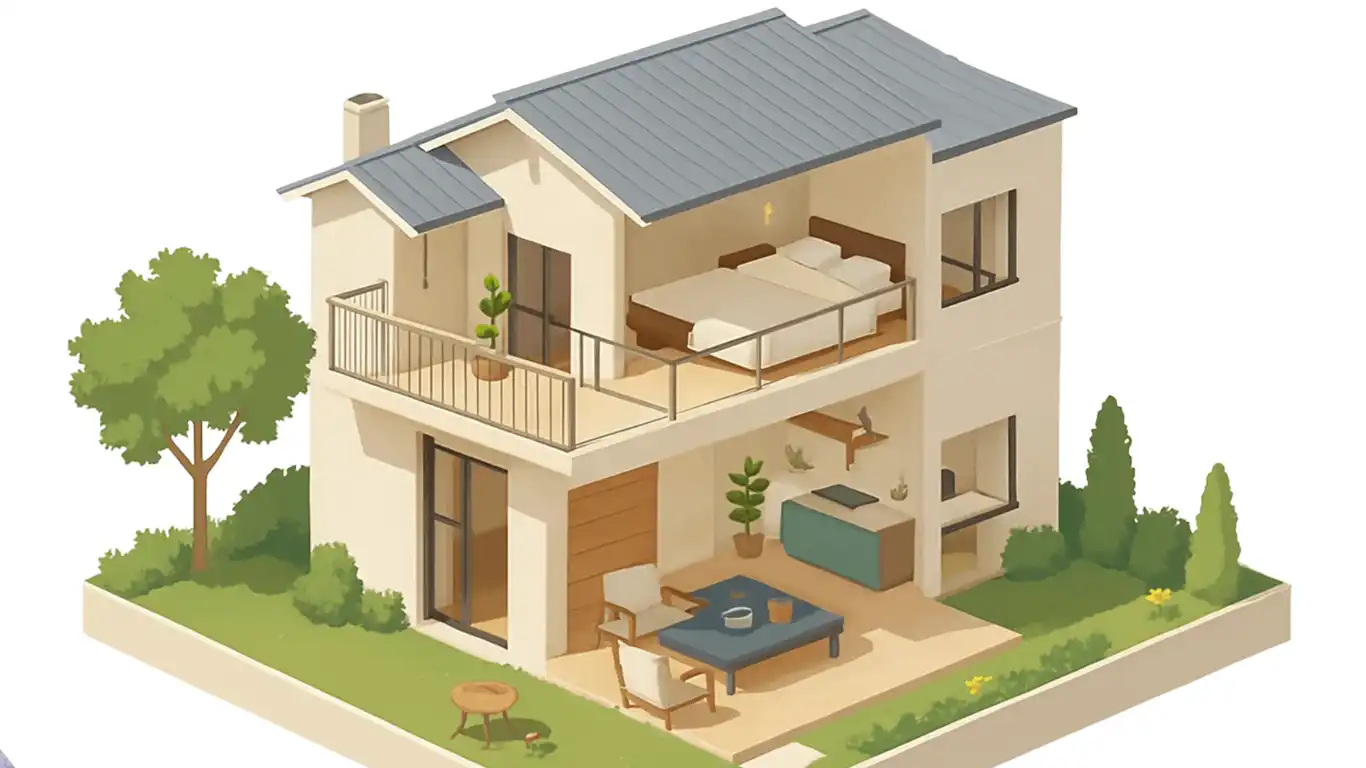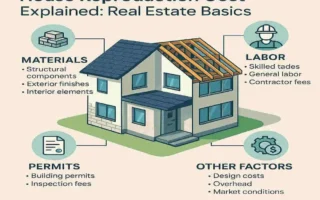Buying a home is one of those big life milestones that can feel both exciting and overwhelming, especially if you’re earning around $90,000 a year. You might be asking yourself, How much house can I afford with 90k? It’s a smart question because jumping into homeownership without crunching the numbers can lead to stress down the road.
Understanding Home Affordability Basics
Figuring out how much house I can afford starts with getting the basics right. Modren Home affordability isn’t just about what you earn—it’s about what you can comfortably pay each month without stretching yourself too thin. Lenders look at your finances to decide if you’re a safe bet for a mortgage, and you should, too, to avoid buyer’s remorse. Why does this matter? Buying a house that’s more than you can afford might mean cutting back on vacations, eating out, or even retirement savings. On the other hand, understanding affordability helps you find a home that suits your life perfectly.
What Lenders Look At: Gross Income vs. Net Income

First, let’s discuss income. Your gross income is the full $90,000 you earn before taxes and deductions. But what really counts for budgeting is your net income—that’s what hits your bank account after Uncle Sam takes his share. For someone making $ 90,000 a year, your monthly gross income might be approximately $7,500. After house taxes (say, 20-25% depending on your state and filing status), you’re looking at around $5,625 to $6,000 take-home pay. Lenders focus on gross for approvals, but you need to live off the net. Don’t forget to factor that in when asking, ‘ How much house can I afford, 90k? ‘
The Debt-to-Income Ratio: Your Mortgage Gatekeeper
A good DTI is under 36%, with no more than 28% going to housing. On a $90K salary, that’s about $2,100 max for your mortgage, taxes, and insurance. If you have high student loans or car payments, your DTI climbs, limiting your mortgage on a 90k income. Imagine you have $500 in monthly debts. Your DTI would be around 8% without a mortgage—plenty of room for improvement. But add a big house payment, and you could quickly reach the limit. Keep this low to boost your chances.
Credit Score: The Silent Influencer
Your credit score is like your financial report card. Scores above 700 often get you better interest rates, which means lower monthly payments and more house design for your buck. On a $90K income, a score of 620 might qualify you, but expect higher rates—like 5% instead of 3.5%. That could add hundreds to your monthly bill. Check your score early and fix any issues to improve your house affordability with a 90k salary.
Common Affordability Rules: The 28/36 Guideline
Many experts swear by the 28/36 rule. It states that housing costs shouldn’t exceed 28% of your gross income, and total debts should be no more than 36%. For you on $90K, 28% of $7,500 monthly gross is $2,100. That covers mortgage, taxes, insurance, and HOA fees. Total debts? Up to $2,700. Let’s say you apply this: With a 4% interest rate and 20% down, you might afford a $300,000 home improvement. But adjust for your situation—it’s not one-size-fits-all.
Calculating How Much House You Can Afford on $90K

Now that we’ve covered the basics, let’s get into the nitty-gritty of calculations. You’re probably wondering how much house I can afford, 90k after taxes, bills, and life expenses. We’ll break it down step by step, using real numbers tailored to a $90,000 annual salary. Start by estimating your monthly income. On $90K gross, that’s $7,500 per month. After taxes and deductions (let’s assume 25% for simplicity), you’re left with about $5,625 net. From there, subtract everyday costs like groceries, utilities, and savings to see what’s left for house cleaning.
Breaking Down Typical Expenses
Expenses eat into your budget fast. On a $90K income, you might spend $1,000 on food, $300 on transportation, $200 on utilities, and $500 on debts or entertainment. That leaves roughly $3,625 for housing, savings, and emergencies. Don’t forget housing-specific add-ons: property taxes (approximately 1% of the home’s value), homeowners’ insurance ($100-$200 per month), and utilities ($200-$300 per month). These pile up, so factor them in when calculating your mortgage on a 90k income.
Mortgage Calculations: Down Payments, Rates, and Terms
For a 5% down payment on a $300,000 home, you’d borrow $285,000. At a 4% interest rate, the monthly payment of principal and interest is approximately $1,361. Add $250 for taxes/insurance, and you’re at $1,611—within the 28% rule for $90K. But let’s vary it. A 20% down payment means no mortgage insurance, saving you money. Shorter terms, like 15 years, house building equity faster, but increase payments.
Using Tables for Clarity
To create this visual, here’s a table showing estimated home prices you could afford, based on the amount of house you can afford, 90k, under different scenarios. Assumptions: DTI under 36%, good credit, and including $300/month for taxes/insurance. (These are approximations—use a calculator for your exact numbers.)
Down Payment %Interest Rate Loan Term Max Monthly Payment (28% Rule)Estimated Max Home Price
5% 3.5% 30 years $2,100 $380,000
5% 5% 30 years $2,100 $310,000
10% 4% 30 years $2,100 $350,000
20% 4% 15 years $2,100 $280,000 (higher payment, faster payoff)
20% 5% 30 years $2,100 $320,000
See how a lower rate stretches your budget? At 3.5%, you could aim higher than at 5%. For a mortgage on 90k income, always add 1-2% for taxes and insurance.
Overview of Mortgage Affordability Calculators

Tools like those from Bankrate or Zillow make this easy. Plug in your $90K salary, debts, down payment, and location—they spit out a personalised range. For example, input $90,000 income, $10,000 down, 4% rate, and low debts. You might get $325,000 as an affordable option. However, remember that these are starting points. Talk to a lender for the real deal on house affordability with a 90k salary. Play around with one yourself. What if you save more for a down payment? Or pay off a credit card? Small changes can add tens of thousands to what you can afford.
Debt Levels and Monthly Obligations
High debts can be a significant hindrance to affordability. If you owe $400/month on a car and $300 on student loans, that’s $700 less for housing. Lenders cap total DTI at 36%, so on $90K, keep debts under $2,700 total. Pay down high-interest stuff first. Imagine slashing $200 off your monthly payments—that could let you afford $40,000 more house loan. It’s all about freeing up cash for your mortgage on a 90k income.
Credit Score’s Big Role
A stellar credit score opens doors. Below 680? You may face 0.5-1% higher rates, which could add $ 100 or more to your monthly payments. On $ 90,000, that shrinks your maximum home price by $20,000-$ 30,000. Boost it by paying bills on time and keeping credit use low. You’ve got this—small habits pay off big in house affordability with a 90k salary.
Down Payment Size and Mortgage Insurance
Bigger down payments mean smaller loans and often no private mortgage insurance (PMI), which costs $ 50- $100 per month if the down payment is under 20%. Save 10-20% to maximise your savings. For a $300,000 home, 20% is $60,000—tough but doable with time and effort. This directly boosts what you can afford on how much house I can afford with 90k.
Location-Based Costs: Taxes, Insurance, and More
Where you live changes everything. High-tax states like New Jersey add $300/month, while low ones like Texas save you. Insurance varies too—coastal areas might double costs due to floods. Don’t overlook HOA fees (ranging from $200 to $500/month) or maintenance costs (ranging from $100 to $300). Urban spots have higher utilities. Choose wisely to stretch your $90K income.
Improving Affordability Through Budgeting
Budget like a pro: Track spending for three months and cut extras. Refinancing existing debts can lower rates. These steps make a real difference in home buying tips for $90,000 income. Ready to make the most of your $90K income? Here are actionable home-buying tips for $90,000 income to boost what you can afford. Let’s turn that salary into serious house buying power.
Save Aggressively for a Down Payment

Aim high—20% avoids PMI and lowers payments. On $90K, set aside $500/month; in two years, that’s $12,000 plus interest. Automate savings to build it effortlessly. Pay off credit cards or consolidate loans. Lowering DTI frees up hundreds for housing. Consider: No car payment could add $50,000 to the affordable price of your luxury home. Check your report free at AnnualCreditReport.com. Dispute errors and pay down balances. A 50-point boost might save you $20,000 over the life of the loan.




